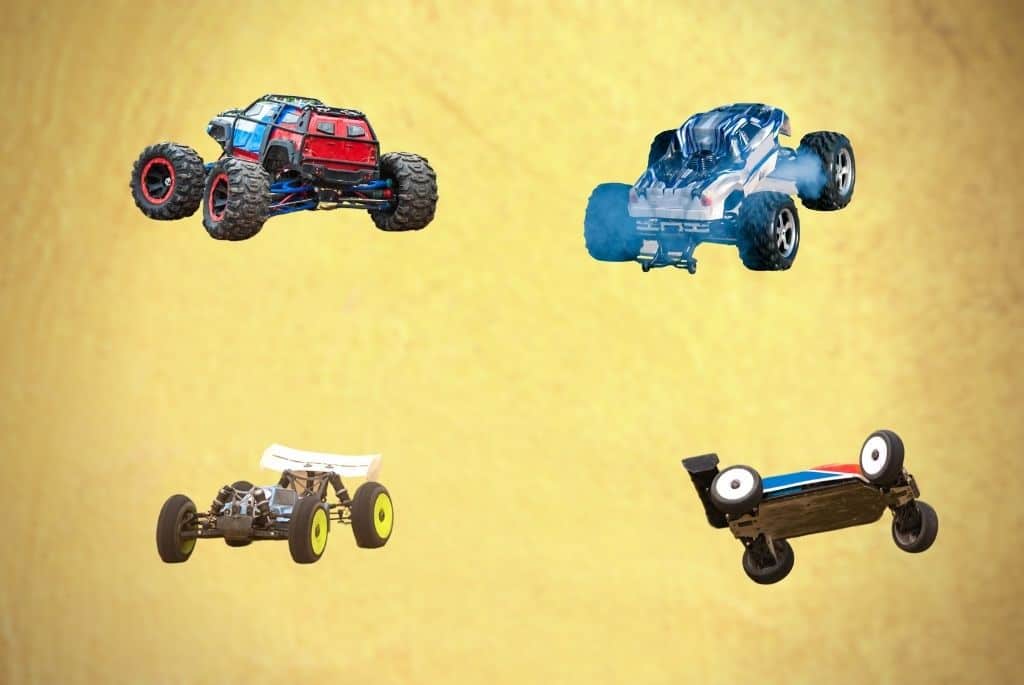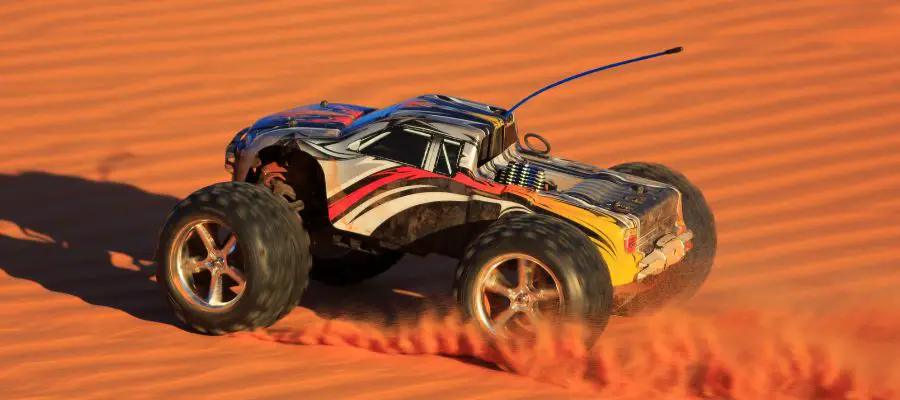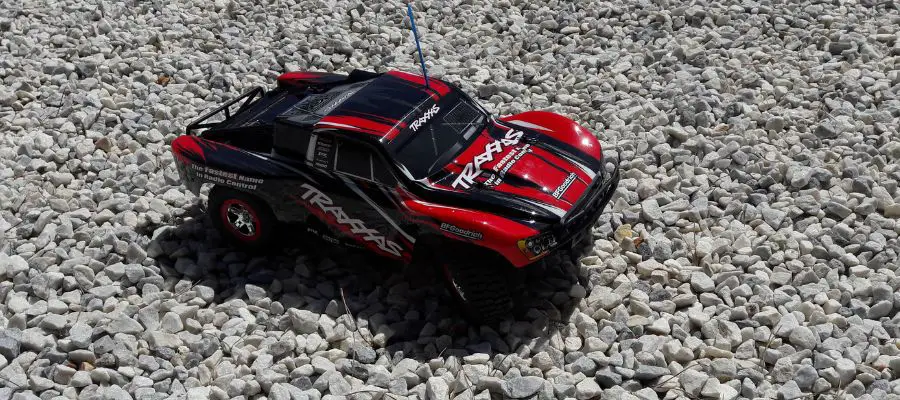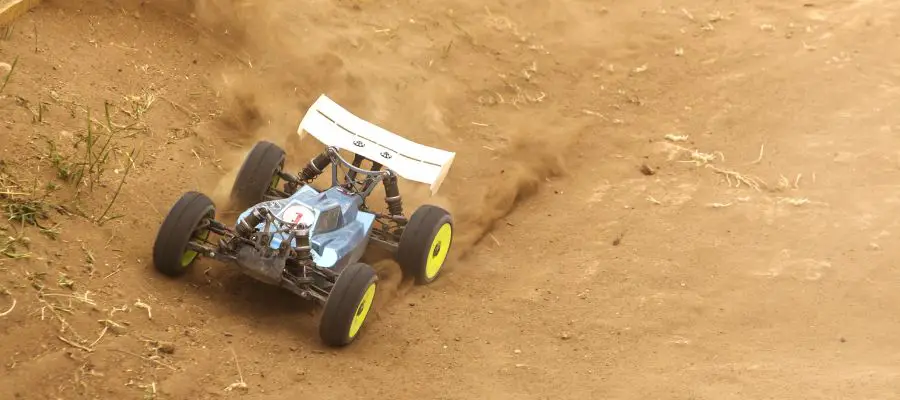
There are a lot of different types of RC vehicles. I remember when I first got into this as a hobby, I was caught by surprise upon my discovery of the sheer variety of RC vehicles.
You probably have the same questions I had a long time ago, one of which was what is the difference between an RC truck and an RC buggy.
RC trucks compared to Buggies are heavier, bigger, and better for bashing, whereas RC buggies are smaller with better maneuverability and better for racing as opposed to bashing. Whether or not an RC truck or a buggy will be better for you will depend on how and where you intend to use it.
This is the TL:DR version; however, there are a lot of little caveats. So if you want to learn more, continue reading below. You will find the answers to many questions about the differences between RC trucks, buggies, and even truggies.
What Is the Difference Between an RC Truck and an RC Buggy?
Before we continue, I need to make a few important distinctions. There are different types of sub-categories of RC trucks. There are Monster Trucks, Stadium Trucks, Short Course Trucks. (In some instances even the Rock Crawlers can be considered a type of an RC truck.) There is also a hybrid between the truck and the buggy known as a truggy.
Below I will be covering each one of these giving detailed information and going over their differences, pros, and cons so that you can easily see how they compare to each other.
RC Monster Trucks (MT)

RC monster trucks usually have a lot of ground clearance. Have you ever seen those huge monster trucks people used to crush old cars with? Well, this is what a standard RC monster truck looks like.
The thread on the tires of monster trucks is more aggressive, and the tires themselves are usually significantly larger. The suspension system on RC trucks is usually one of the strongest of all RC vehicles.
RC trucks are used mainly for off road driving and fun. They flip a lot and bounce a lot—also a perfect vehicle for someone who wants to make a lot of jumps.
There can be found both 4WD and 2WD monster trucks. (There are 6WD monster trucks as well.) Gas, nitro, and electric models are available, too. With that being said, monster trucks usually do not have a bump start.
RC monster trucks come in all kinds of sizes.
They usually start at 1/5 scale and can go down to 1/28. The 1/10 scale monster trucks remain the most popularly used ones.
RC trucks usually have a larger and bigger frame compared to RC buggies. Oftentimes they are really powerful with stronger and sturdier frames and drive shafts. The higher torque also makes those very good at even pulling stuff.
Overall, monster trucks have a higher center of gravity and are significantly heavier compared to a buggy.
RC Stadium Trucks
It may be very confusing as to what is considered a stadium truck, but there are some aspects of stadium trucks that make them a little different.
RC stadium trucks are predominantly electric and smaller in scale (1/10 or smaller).
They are also mostly 2WD, but there can also be found, 4WD models. (Although a 4WD stadium truck should technically be considered more of a truggy.)
STs are more fun and great for doing jumps and stunts.
Frequently stadium trucks will be electric and slightly smaller in size (1/10 to 1/18).
There can always be exceptions to these rules, as sometimes it is up to the manufacturer and how they will name a particular RC vehicle.
RC Short Course Trucks (SCT)

Short course trucks are in certain ways similar to stadium trucks, but they are also very different.
Related post: RC Monster Truck vs. Short Course: Whats The Difference?
The main differences between an RC stadium truck and a short course truck are the body dimensions and design, and the wheels and tires.
SCTs have a more realistic scale—in other words, they look more like real-scale cars; they also have their tires under the fenders.
Short course trucks, compared to stadium trucks, are narrower and typically have a longer wheelbase. The tires are also smaller and shorter.
All of this allows SCTs to do well on both smoother and rougher terrain.
RC SCTs can be found in different sizes ranging from 1/5 down to 1/28, for example. (The 1/10 remain the most popular ones, as usual.)
Both 4WD and 2WD models can be found on the market, with the majority of SCTs being electric, though, gas models can also be found.
RC Buggy

RC buggies are very similar to real-scale buggies. They have more ground clearance than the standard RC car, but less than an RC truck. The stock tires of RC buggies are also different; they are made for better traction on dirt, clay, and muddy tracks.
By default, RC buggies are made for on-track driving. Usually, buggies have knobby tires and better suspension systems than standard RC cars but not as strong as the one on RC trucks.
Gas, electric, and nitro buggies can be found, as well as 4WD and 2WD models. Usually, they come in a wide variety of different sizes from 1/5 to 1/28. With that being said, the majority of buggies are electric, 4WD, and between 1/10 and 1/8 in scale.
RC buggies frame is smaller than comparable scale RC trucks.
RC Truggy
Just as you thought that we might be done, well, let me present to you the truggy.
Maybe someone a long time ago wondered the same thing, should they get an RC truck or buggy? And someone else said, “Why not both?” Hence the truggy was built.
The simplest way to explain what a truggy looks like is by describing it as a slightly bigger buggy with bigger tires.
Truggies were designed as a hybrid between the truck and the buggy. These are very fast and easy to control vehicles. Truggies are usually, almost always, going to be 4WD. They are typically built to run on nitro, but electric models can also be found. They are built for speed and maneuverability.
RC truggies come in slightly bigger sizes between 1/8 and 1/14 in scale.
Is an RC Truck or a Buggy Better for Racing?
RC buggies can be used for racing, and they are some of the best performers on the track. They are best for smooth tracks. In comparison, RC trucks do not perform as well as track vehicles.
RC buggies are easier to handle, control, and will, in general, outperform an RC truck if they will be racing on a track. Even on rougher and more uneven tracks, they tend to be better.
The RC trucks can, of course, be used on smooth tracks, but if you are racing against buggies, you will be at a severe disadvantage. They are not as stable, and will tend to sway, bounce, and even flip more.
Even though RC trucks (especially monster trucks) are not designed for racing on well-groomed tracks, they are perfect for and super fun on more extreme tracks that involve a lot of jumps.
Now, if we compare buggies and trucks to truggies, we will find something very interesting. It is almost like taking the best of both worlds; truggies perform very well on both smoother and rougher racing tracks.
Is an RC Truck or a Buggy Better for Bashing?
When it comes down to bashing RC trucks (especially monster trucks) are head and shoulders above the rest of the vehicles.
The higher ground clearance will make them perform better on steeper hills and areas with higher grass.
RC trucks are made for bashing and fun—as a result, they are incredibly durable and tough. RC trucks are great for jumps and will not get easily damaged by 10 or even 30 feet high jumps.
Buggies can also be used for bashing, but you will have to be more careful on what surface and how you will be driving them. They perform better on pavement, low grass, hard-packed dirt, clay, etc. If you try to use them on more extreme surfaces, they may get easily damaged or stuck.
Let’s not forget about truggies, though, as they—although being a race breed—can do pretty good bashers, too. However, and it is a big one, using a truggy for bashing is like taking a Lamborghini off-road racing. Technically you can do it, but it is not really recommended.
The Cost of RC Trucks vs. RC Buggies
Since we are comparing RC trucks and buggies, it only makes sense to take a look at how they are priced and how much they usually tend to cost.
Below I have listed the cost of RC trucks and RC buggies (including their variations). These prices will give you a good idea of how much these RC vehicles tend to cost.
- RC monster trucks cost between $50 and $1,000. There are also slightly cheaper monster trucks that can go for $30 or so.
- RC stadium trucks cost between $140 and $600, in most cases.
- RC short course trucks cost between $50 and $1,600.
- RC buggies usually cost between $100 and $1,300. However, there can be found some cheaper RC buggies that sell for as little as $30.
- RC truggies cost between $180 and $1,300. Some cheaper alternatives go for as little as $60 in some instances, however, these are frequently of lower quality.
As you can see, RC trucks can cost as little as $30 and as high as $1,600. However, there are always some exceptions to the rule. There are some RC semi-truck models that can cost as much as $2,900.
Related post: How Much Do RC Trucks Cost? Best Models For the Money
On the other hand, RC buggies cost between $30 and $1,300 in the vast majority of cases.
On the low end, you can see that both the trucks and buggies will cost pretty much the same, with the slight tendency for RC trucks to cost a little more. However, there is a big difference between $30 and $1,600, so why is that?
With RC vehicles, you get what you pay for. It is not a rule set in stone, of course, but a higher-priced vehicle performs better, is more durable and long-lasting, and overall of higher quality.
The price fluctuations are caused by different factors like:
- The size: RC vehicles come in all kinds of different scales or sizes. (The most typical sizes start from 1/5 down to 1/32, with the 1/10 scale being the most popular.) The bigger the size of the RC vehicle, the more expensive it will be.
- The fuel type: RC vehicles that run on gas or nitro are usually more expensive than electric. Electric RC vehicles will either be equipped with a brushless or brushed electric motor. Brushless motors are superior to brushed, but also slightly more expensive.
- The brand: There is no denying that the brand plays an important role in the pricing of the RC vehicles.
- The completion level: RC vehicles can be purchased at different levels of completion. There are ready-to-run, almost ready-to-run, kits, and others.
- The number of drive wheels: There are 2WD, 4WD, 6WD, and even 8WD, RC trucks. RC buggies, on the other hand, will either be 2WD or 4WD. The higher the number of the drive wheels, the more expensive the vehicle will be.
A good price range to aim for both RC trucks and buggies is between $300 to $800. With that being said, good quality RC trucks and buggies can also be found for as low as $150 or so. But if you really want to feel what it is like to drive a high-quality RC vehicle, there is no way around it—they are more expensive.
Is an RC Truck or an RC Buggy Better for You?
In order to find what you should choose, an RC truck or a buggy, you need to have a good idea of how and where you will be using it. They do not perform and handle the same way. In fact, they are very different.
If you will be using your RC vehicle on smooth surfaces, an RC buggy will do better than an RC truck.
If you will be driving your RC vehicle off-road, an RC truck is the better choice, although a buggy is also a viable option.
Lastly, SCTs are, arguably, getting a little more popular than stadium trucks, so depending on where you live, an SCT may be a better choice simply due to its popularity.
The more realistic scale, the different chassis design, and tires make those more fun to race. SCTs tend to be heavier and slightly harder to control, which some people tend to find a lot of fun compared to a stadium truck. They tend to sway more and handle a lot more loosely compared to a buggy.
SCTs are a lot better at power sliding (drifting), counter steering, and all that fun stuff.
I mean, there is racing, and then there is fun, and these two things do not always have an intersecting point.
Stadium trucks, on the other hand, handle a lot better, even on rougher terrain. This makes them great for racing, but a lot of people do not find them fun. They are generally speaking faster than most MTs and still reasonably good at jumping. They are also tougher and not as fragile as the buggies. (Stadium trucks can be considered somewhere in the middle between a buggy and an SCT.)
Buggies are built with one purpose in mind—racing. They are mostly 4WD with a central differential; they are easier to control and maneuver and have less sway (if correctly setup). Think of buggies as the little F1s of the RC world.
Both RC trucks and buggies can be used for bashing. Regardless if you will be driving them in your backyard or somewhere else, both vehicles are very fun to use and drive. However, buggies are more fragile and can break more easily, so bashing is usually reserved for RC monster trucks.
Truggies, as you now know, are also built for racing. They have excellent maneuverability, handling, predictability, and control. This is great if you intend to race with your RC vehicle. However, some people may also find truggies a bit boring. If you want just to have fun doing extreme jumps and going at full bore over different obstacles than a monster truck is a better option.
If you are a complete beginner, both RC trucks and buggies are a viable option as they are all beginner-friendly. In this case, it is not your experience that is going to be the determining factor in which one is better for you. (Conversely, RC trucks may sometimes be a little easier to service and maintain, though.)
When deciding on what RC vehicle to buy, you need to consider where and how you will be driving it and how much your budget is.
If you will be driving your RC vehicle in your backyard, on grass, dirt, or pavement, and are overall looking for fun bashing it a 1/10 RC monster truck is the way to go. (MTs can be used on mud, sand, and even snow, too.) RC trucks can be used on racing tracks as well, although they will not be able to compete against buggies and truggies. Overall, RC trucks are simply more fun and super versatile.
If you will be racing and using your RC vehicle on smoother surfaces, low grass, packed dirt, gravel, or clay an RC buggy or a truggy are both excellent options.
For a huge selection of RC trucks and buggies, no matter your budget. You can check them out on Amazon by clicking here
